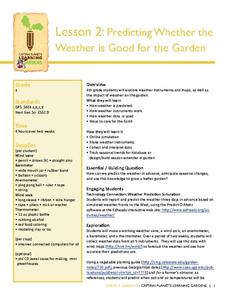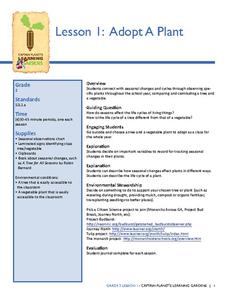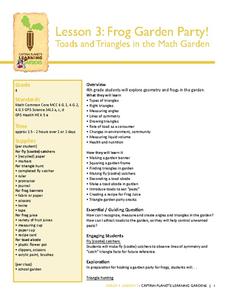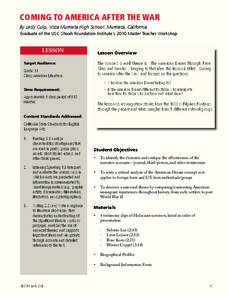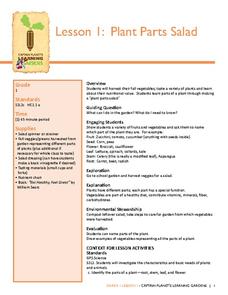Smithsonian Institution
George Washington: A National Treasure
Take a closer look at the life and presidency of George Washington with this great set of lesson plans and worksheets. The resource includes a timeline of the president's life and multiple opportunities for primary source and...
Asian Art Museum
Telling Tales with Kamishibai
Kamishibai (paper drama), is a Japanese form of storytelling that uses emakimono (paper picture scrolls), to relay a moral lesson. As part of a series of resources that examine Japanese art and artists, learners watch a video...
Captain Planet Foundation
Which Plant Is Which?
Learn about dichotomous keys, plant identification, and how to care for the planet with a lesson that includes several hands-on and innovative activities. Kids go on a plant scavenger hunt and classify the plants that they find...
Captain Planet Foundation
Predicting Whether the Weather is Good for the Garden
Can your class predict the weather? Show them how they can come close with a lesson about creating weather instruments, including weather vanes, barometers, wind socks, anemometers, and thermometers. Kids research weather patterns and...
Captain Planet Foundation
Help a Sister Out: Garden Companions
Explore Native American gardening traditions with a lesson on companion planting. Based on the concept that certain crops grow better when planted near other specific crops, kids research the gardening method with background links and by...
Captain Planet Foundation
Sorting Out Soils
Sift through soil and learn about why it's important for organic processes. After discussing what makes up soil, such as the living organisms and what types of soil have more nutrients, kids sample layers of mulch and deeper soil to...
Captain Planet Foundation
Adopt-A-Plant
Note the way that plants change during the season by adopting a plant on your school campus. After your class chooses their plant, they research the plant's needs, how it differs from other plants, find ways to support their plant's...
Captain Planet Foundation
Square Foot Fall Garden
First graders learn the basic needs of plants and identify geometric shapes while planting a fall garden. Combining math and science in one activity, the resource guides kids through starting their class garden as they...
Captain Planet Foundation
P is for Poppies
Explore the way local farming and rationing helped the war effort in World War I with a lesson plan on gardening. After learning about trench warfare, reading "In Flanders' Field" by John McCrae, and studying poppies, kids discuss...
Captain Planet Foundation
Frog Garden Party! Toads and Triangles in the Math Garden
It's frog party time! With frog banners, frog juice, and a triangle hunt, your garden party is sure to be both entertaining and educational. The lesson connects geometry, earth science, and delicious snacks to teach kids about ecosystems...
Captain Planet Foundation
Energy Flow in the Garden
How can you tell what an owl has eaten? Study the food chain and flow of energy in an ecosystem by dissecting an owl pellet and noting the bones found inside. Additionally, the lesson includes a game about consumers and producers with a...
Captain Planet Foundation
Worm Your Way Out of This
How can you provide healthy soil for your garden? Study worms, bacteria, and other microorganisms in a lesson about decomposition and organic compost. After discussing what you know about worms and watching a video, watch what worms do...
Captain Planet Foundation
Solar Cooking Race
Study heat transfer with activities that focus on how heat energy works. Using a solar cooker, ice cubes, and heat transfer bracelets, kids experiment and record what they find by keeping ice cubes cold and vegetables hot.
Captain Planet Foundation
Shape Shifters in the Math Garden
Combines mathematical measurement with gardening skills. Third graders hunt for worms in the garden and try to find the longest one. They also measure and weigh vegetables that they harvest from the garden, measure rainfall amounts,...
University of Southern California
Coming to America After the War
As part of their exploration of the American dream, class members examine primary source materials to compare immigrant experiences of those arriving early in our country's history to those arriving in the US after World War...
University of Southern California
Persecution of the German-Jews: The Early Years - 1933-1939
Young historians learn about the dehumanization process of stripping German Jews of basic, fundamental rights prior to the genocide of European Jews in the 1940s. Learners watch video clips of survivors who recount such events...
National Endowment for the Humanities
Chronicling America: Uncovering a World at War
As part of a study of World War I, class members read newspaper articles from the time that urge American involvement, non-involvement, or neutrality. Using the provided worksheet, groups analyze the articles noting the central argument...
National Endowment for the Humanities
Galileo: Revealing the Universe
To gain an understanding of the significance of Galileo Galilei's revolutionary ideas, class members watch the short video "Stargazing Before Galileo," and conduct a close reading of Galileo's Sidereal Messsenger. They then...
National Endowment for the Humanities
David Walker vs. John Day: Two Nineteenth-Century Free Black Men
What was the most beneficial policy for nineteenth-century African Americans: to stay in the United States and work for freedom, or to immigrate to a new place and build a society elsewhere? Your young historians will construct an...
Curated OER
Land and Liberty: The Saga of Sam McCulloch
The struggles of Sam McCulloch, a free black man, to be recognized as a citizen entitled to own land in Texas are the focus of research project that ask groups to examine a series of primary source documents and piece together...
Captain Planet Foundation
Rotting Away
What happens at the end of a plant's life cycle? Show kids the natural way that plants show that they're decomposing, as well as the importance of compost, with a lesson about living organisms. After reading Log Cabin by Anne Schreiber,...
Captain Planet Foundation
George Washington Carver and the Sweet Potato
Learn about George Washington Carver's important contributions to agriculture by studying the sweet potato. First graders read about the inventor's observations and prepare sweet potato slips for the class garden. Additionally, they...
Captain Planet Foundation
Plant Parts Salad
How are vegetables beneficial to a healthy diet? Have kids examine different types of vegetables, such as zucchini, broccoli, and carrots, and determine which parts of the plant they represent. Then, they taste the vegetables as a...
Captain Planet Foundation
Sense of Place
Explore the five senses with a kindergarten lesson on gardening. After taking a walk through the class garden, kids note what they see, hear, feel, taste, and smell, and then decide what is living in the garden versus what is not living....





